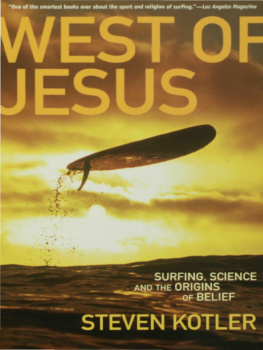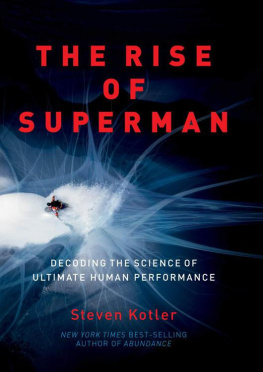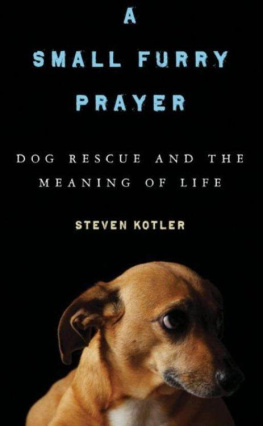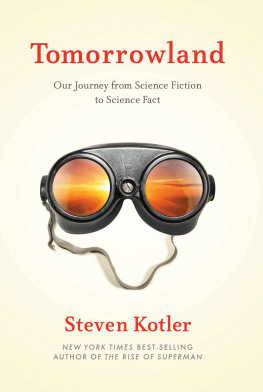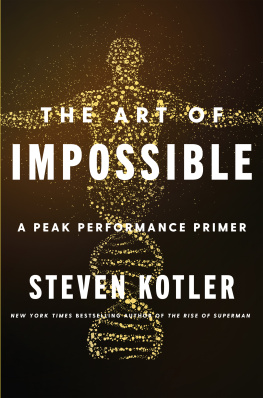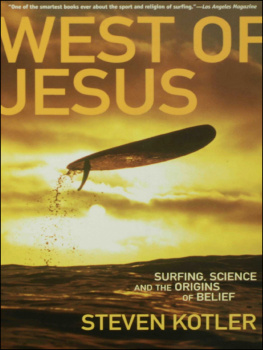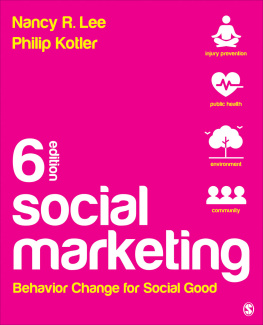Steven Kotler - West of Jesus
Here you can read online Steven Kotler - West of Jesus full text of the book (entire story) in english for free. Download pdf and epub, get meaning, cover and reviews about this ebook. year: 2009, publisher: Bloomsbury Publishing Plc, genre: Detective and thriller. Description of the work, (preface) as well as reviews are available. Best literature library LitArk.com created for fans of good reading and offers a wide selection of genres:
Romance novel
Science fiction
Adventure
Detective
Science
History
Home and family
Prose
Art
Politics
Computer
Non-fiction
Religion
Business
Children
Humor
Choose a favorite category and find really read worthwhile books. Enjoy immersion in the world of imagination, feel the emotions of the characters or learn something new for yourself, make an fascinating discovery.
- Book:West of Jesus
- Author:
- Publisher:Bloomsbury Publishing Plc
- Genre:
- Year:2009
- Rating:5 / 5
- Favourites:Add to favourites
- Your mark:
- 100
- 1
- 2
- 3
- 4
- 5
West of Jesus: summary, description and annotation
We offer to read an annotation, description, summary or preface (depends on what the author of the book "West of Jesus" wrote himself). If you haven't found the necessary information about the book — write in the comments, we will try to find it.
West of Jesus — read online for free the complete book (whole text) full work
Below is the text of the book, divided by pages. System saving the place of the last page read, allows you to conveniently read the book "West of Jesus" online for free, without having to search again every time where you left off. Put a bookmark, and you can go to the page where you finished reading at any time.
Font size:
Interval:
Bookmark:
WEST OF JESUS
By the same author
The Angle Quickest for Flight
WEST OF JESUS
SURFING, SCIENCE AND THE ORIGINS OF BELIEF
STEVEN KOTLER
BLOOMSBURY
Copyright 2006 by Steven Kotler
All rights reserved. No part of this book may be used or reproduced in any manner whatsoever without written permission from the publisher except in the case of brief quotations embodied in critical articles or reviews. For information address Bloomsbury USA, 175 Fifth Avenue, New York, NY 10010.
Portions of the book have appeared in Men's Journal, Discover, GQ, LA Weekly and Blue.
Excerpt from "Water" from Collected Poems by Philip Larkin. Copyright 1998, 2003 by the estate of Philip Larkin. Reprinted by permission of Farrar, Straus, and Giroux, LLC.
Published by Bloomsbury USA, New York
Distributed to the trade by Holtzbrinck Publishers
All papers used by Bloomsbury USA are natural, recyclable products made from wood grown in well-managed forests. The manufacturing processes conform to the environmental regulations of the country of origin.
THE LIBRARY OF CONGRESS HAS CATALOGED THE HARDCOVER EDITION AS FOLLOWS:
Kotler, Steven, 1967
West of Jesus : surfing, science and the origins of belief / Steven Kotler.1st U.S. ed.
p. cm.
eISBN-9-781-59691-344-8
1. Kotler, Steven, 1967- Travel. 2. SurfersUnited StatesBiography. 3. Lyme diseasePatientsUnited StatesBiography. 4. Spiritual life. I. Tide.
GV838.K68 2006
797.3'2092dc22
2005032552
First published in the United States by Bloomsbury in 2006
This paperback edition published in 2007
Paperback ISBN-10:1-59691344-4
ISBN-13:978-1-59691-344-8
10 9 8 7 6 5 4 3
Typeset by Westchester Book Group
Printed in the United States of America by Quebecor World Fairfield
Contents
This is the real world Muchachos, and we are all in it.
Charles Bowden
In The White Album, Joan Didion wrote, "We tell ourselves stories in order to live," and then proceeded to tell a story about a time in her life when the stories she told herself began to fail. Which may be how things go for many of us, and it certainly was for me. In the fall of 2003, at a time when I was making my living as a journalist; at a time when the president of the United States comfortably dismissed the idea of Darwinian evolution in favor of a more economic, six-day approach; at a time when certain members of Congress were trying to remake democracy in their own image; at a time when I was recovering from a long and nagging illness; when many of the people around me began getting married, having children, moving away, or on, or staying exactly where they were, without me; at a time a pair of hurricanes were heavy on the neck of Central America, I went to Mexico to surf. I went because of these things. I went because the stories I told myself had begun to fail.
Owing to the long illness, it had been too long since I'd been someplace tropical. In the years prior, I had spent chunks of my life in far-flung places. When friends asked why I went, I ticked off a long list of mildly verifiable purposes. The truth of the matter was I went to such places because most people didn't. On a map and in reality, such places are hard to get to and far away. I wanted to be the kind of person who went places hard to get to and far away. I was interested in places that are far away on maps, just as I was interested in places that are far away in reality. I didn't know then, not like I know now, that such places do not always coincide.
I was afraid of such journeys and took them anyway. Mexico was almost this kind of quest. Not that my trip there was arduous by anyone's measure. A three-hour flight followed by an hour car ride. The ride was bumpy, but that doesn't count. I was going to a place called Costa Azul, which does not mean, as I was disappointed to find out, "the Blue Cost."
The bitch of it was my suitcase. For starters my suitcase was eight feet long. I take pride in traveling light, so finding myself dragging eight feet of dead weight was embarrassing in a privately psychological way. Plus, owing to the long illness, my time away from the tropics and a seeming predisposition toward exertion, I packed wrong. It was almost a hundred degrees in Mexico. I packed three T-shirts, two pairs of shorts, two sweatshirts, one jacket, two wetsuits, three sweaters and two surfboards. I promised myself that I would do no work in Mexico and then brought fifty magazines, mostly back issues of the Economist and the New Scientist, and a handful of books, including David Quammen's wonderful Monstersof God, about "man-eating predators" and these, their final years on Earth. I took these things because I cared about things like economists, new scientists, tigers. I cared about what happened when the very things humans built myths around began to fail. My bag weighed a fucking ton.
I went to Mexico because I had spent the summer working as hard as I can remember working while realizing that my life had somehow developed a heavy glass ceiling that I was constantly slamming my head against. I was thirty-six years old, a citizen or at least a taxpayer, in need of a new couch, fully capable of making green beans in the Szechuan style, single, not especially lonely, plagued by junk mail, attached to the words of Ernest Hemingway: "The world breaks everyone and afterwards many are stronger at the broken places." I was a little amazed that life was nothing more than an accumulation of days. I was suffering that same disjointed feeling that many my age seem to suffer: life was not going to be anything other than what I made it.
If I chose to stay home and watch television, I was choosing not to do something else. I once drove a car with a KILL YOUR TELEVISION bumper sticker on it. It felt like lifetimes ago, many lifetimes ago. Now I lived in Hollywood and had developed an unnatural attachment to The West Wing. One of the things I learned watching The West Wing is that if you combine the populations of Great Britain, France, Germany, Japan, Switzerland, Sweden, Denmark and Australia, you'll get a population roughly the size of the United States, where, last year, there were 32,000 gun deaths. Those other countries, which all have a form of gun control, had a total of 112.
In the course of my life I've had four handguns waved in my face, been caught in automatic weapon's crossfire on three other occasions and was once muzzle slammed with an AK-47 by an Indonesian soldier in a Balinese nightclub after a deejay decided to play punk rock and we decided to slam danceapparently a crime in that country. I've also known more than my fair share of people who have been on both sides of a firearm. Two come to mind. The first was a professional skier who took a random sniper's bullet through his windshield and then his lung while driving through the Sierra Nevada. The second was an enforcer for the Hell's Angels. He was a small guy, a fact I found surprising since being an enforcer for the Hell's Angels seemed to be a job that would require some mass. He once told me that he was good at his job because he was willing to do more damage than anyone thought possible. The last I heard he had rolled his van while crossing the Arizona desert. When the cops came to extract him
from the wreckage, they found enough firepower to start a small war in a small country.
I can say that at the time I went to Mexico I was thirty-six years old and the things I was choosing not to do were starting to add up into a whole other life I was choosing not to live.
In September of 2000,1 was living with my girlfriend in an apartment in Los Angeles. The apartment and the girlfriend were both beautiful. I wanted, desperately, for them to be both my dream apartment and my dream girl, but in both casesas it turned outthe rent was too steep. When people asked me exacdy where in Los Angeles my apartment was, I would say Beachwood Canyon, and when they inevitably asked where Beachwood Canyon was, I would tell them that when an earthquake finally shook free those bold letters of the HOLLYWOOD sign, the
Next pageFont size:
Interval:
Bookmark:
Similar books «West of Jesus»
Look at similar books to West of Jesus. We have selected literature similar in name and meaning in the hope of providing readers with more options to find new, interesting, not yet read works.
Discussion, reviews of the book West of Jesus and just readers' own opinions. Leave your comments, write what you think about the work, its meaning or the main characters. Specify what exactly you liked and what you didn't like, and why you think so.

